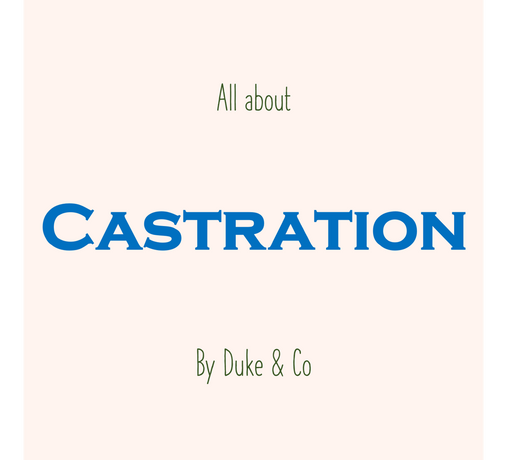Further to our fabulous blog about spaying female pets, we only thought it right to do one about castration in males. This can require a little more thought in dogs than other species, read below to find out why:
Castration is the process of removing the testes (testicles) in a male, this can prevent a number of health issues and, of course, unwanted pregnancies! It is a relatively simple procedure compared to spaying a female as it doesn’t require surgery within the abdominal cavity and so is less painful.
Which species do we routinely castrate?
- Dogs
- Cats
- Rabbits
- Guinea Pigs
- Rats
There are a number of benefits to castration including:
-
Stops unwanted pregnancies – if the testicles aren’t there, they can’t produce any sperm! However it is important to note that males are still fertile for a period of time after castration, due to some sperm remaining in the genital tract. According to studies, this period varies between species:
- Dogs and cats – 6 weeks
- Rabbits and guinea pigs – 4 weeks
- Rats – 2 weeks
- Stops testicular tumours/cancer – testicular tumours are one of the most common tumours to occur in adult male dogs. They have the potential to spread elsewhere in the body, hence causing problems. If a male does get a testicular tumour they can easily be removed, however there is the chance that it may have already spread prior to surgery. In non-castrated males it is important to check the testicles occasionally for any sudden changes.
- Stops testicular torsion – this is a condition where the testicle can become twisted, cutting off the blood supply. It can be incredibly painful. Treatment again is castration and good pain management.
- Reduces the chance of prostate problems – problems with the prostate are more likely in non-castrated males due to the prolonged hormonal drive throughout their lives (prostatic hyperplasia/enlargement). This condition can be treated with castration, a reduction in the hormone drive will reduce the enlargement of the prostate and so reduce the symptoms.
- Reduce unwanted behaviours – castration at the right stage in life will help to reduce the likelihood of the pet developing undesirable behaviours associated with being male. These include spraying/scent marking, roaming, humping and aggression. However, in some cases if the behaviour has become a learnt behaviour already, castration may not reduce/stop the behaviour.
- Reduces the risk of theft – unfortunately, unneutered dogs especially, have been targeted recently for breeding purposes. Neutering (castrating males and spaying females) makes them less desirable to thieves. Dog tags can be bought stating the pet is neutered to help deter thieves.
What are the risks of spaying?
- General anaesthetic – every neuter has to be carried out under general anaesthetic. An anaesthetic always carries a risk. In most routine neuters, this risk is minimal as the pet is usually young and healthy. Bloods can be taken before the procedure to check for any potential problems and fluids (a drip) can be given during the procedure to help support their blood pressure throughout – in turn reducing the risk.
- Bleeding – removal of the testicles carries the risk of bleeding during or after surgery. During surgery the vet is always vigilant and will double check everything, if any blood vessels need closing off again this will be done. After surgery it is important to keep the patient calm where possible and avoid too much exercise/play.
*It can be useful to give calming products shortly before and in the recovery period after surgery to help keep dogs calm. We have a range of products, our favourite being Wendals Dog Calmer, available in two different sizes, handy for short recovery periods or longer-term use: https://dukeandcopetsupplies.com/products/wendals-dog-calmer?_pos=2&_sid=206e6e3dd&_ss=r
- Infection – there is always a risk of infection, however the procedure is performed in a sterile manner. It is not routine to give antibiotics after a neutering procedure unless the vet is concerned that there has been contamination during the surgery.
- Hernia – herniation of abdominal organs through the inguinal ring (the opening between the abdomen and where the testicle was) is more common in rabbits and guinea pigs. For this reason, the tunic (capsule) that the testicle usually sits within is closed again after surgery, preventing herniation.
It is important to speak to your vet or veterinary nurse about spaying your pet and also the correct timing, as this varies between species and individuals. In larger breed dogs it is recommended to delay castration to allow better bone development.
Dog Behaviour and Castration
New studies have found a crucial link between dog behaviour and castration. They found that dogs that were anxious prior to castration, became more anxious after surgery. So why is this important?
The reason behind this worsening in anxiety is due to the removal of the testosterone (produced by the testicles). This hormone not only increases muscle mass and bone density, but also helps to improve self confidence and reduce fearfulness. In a dog that was well socialised and is naturally confident in most situations, this reduction in testosterone is likely to have little effect. However, if a dog was already of a nervous disposition, this will only worsen, as the hormone letting him know he’s ok, has gone.
This is important as a dog that feels more vulnerable is later likely to become ‘nervous aggressive’, meaning in difficult situations (such as vet visits) if something worries the dog, he is more likely to resort to snapping or biting.
Before castration is considered it is important to fully assess how confident the dog is in a range of situations. He should be easy to read and confident before undergoing the procedure. If he isn’t, it’s important to delay the procedure and spend some more time socialising him and building up his confidence in a range of environments.

Ellie Phipps BVSc MRCVS
Veterinary Surgeon
